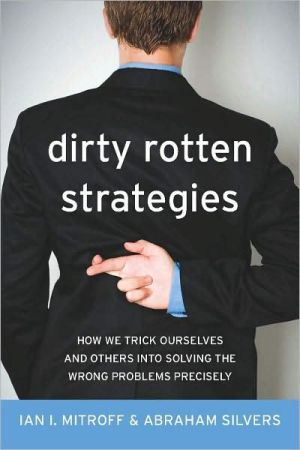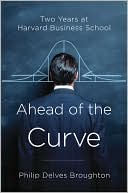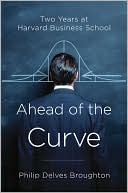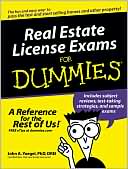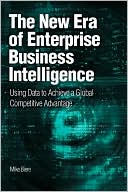Dirty Rotten Strategies: How We Trick Ourselves and Others into Solving the Wrong Problems Precisely
People and organizations are perfectly capable of making the most outrageous missteps. But, how does a person, organization, or society know that it is committing an error? And, how can we tell that when others are steering us down wrong paths?\ Dirty Rotten Strategies delves into how organizations and interest groups lure us into solving the "wrong problems" with intricate, but inaccurate, solutions. Authors Ian I. Mitroff and Abraham Silvers argue that we can never be sure if we have set...
Search in google:
Aimed at an "intellectual trade" audience, Dirty Rotten Strategies discusses how and why organizations and special interest groups of all kinds attempt to trick us into solving the wrong problems precisely. Publishers Weekly Starred Review. A pleasant surprise for anyone frustrated with the way complex problems are misconstrued and dumbed-down in daily life, this challenge from business scholars Mitroff and Silvers goes out to media, higher education, health care, and American institutions ranging from government to celebrity, to demonstrate the relevance of concepts in statistical analysis known as "type three" and "type four" errors. Though they're given to philosophical ranting, the authors never struggle with their complex ideas, keeping the text readable for anyone with problems to solve, resolve, absolve or dissolve (i.e., everyone). Those familiar with statistics will find their frustrations with the false type-one/type-two error dichotomy well articulated and addressed, but the theories will connect with anyone who enjoys thinking outside the box. The pair also advocates a new way of considering problems, not just a way of prioritizing them, demonstrating the necessity of new modes of critical thinking when approaching the orthodoxy of American institutions. Copyright © Reed Business Information, a division of Reed Elsevier Inc. All rights reserved.
\ Publishers WeeklyStarred Review. \ A pleasant surprise for anyone frustrated with the way complex problems are misconstrued and dumbed-down in daily life, this challenge from business scholars Mitroff and Silvers goes out to media, higher education, health care, and American institutions ranging from government to celebrity, to demonstrate the relevance of concepts in statistical analysis known as "type three" and "type four" errors. Though they're given to philosophical ranting, the authors never struggle with their complex ideas, keeping the text readable for anyone with problems to solve, resolve, absolve or dissolve (i.e., everyone). Those familiar with statistics will find their frustrations with the false type-one/type-two error dichotomy well articulated and addressed, but the theories will connect with anyone who enjoys thinking outside the box. The pair also advocates a new way of considering problems, not just a way of prioritizing them, demonstrating the necessity of new modes of critical thinking when approaching the orthodoxy of American institutions.\ Copyright © Reed Business Information, a division of Reed Elsevier Inc. All rights reserved.\ \ \ \ \ \ Library JournalMitroff (emeritus, Marshal Sch. of Business, Univ. of Southern California; Crisis Leadership) and Silvers (formerly, statistics, Baylor Coll. of Medicine) have put together a guide to what they refer to as Type Three and Type Four decision errors, that is, respectively unknowingly and knowingly "solving the wrong problems." There's the germ of an idea here, as the authors approach these methodological errors in the realms of American health care, national security, media, academia, and religion, identifying instances in which the various fields solve "the wrong problems precisely." Unfortunately, the tone is high-minded and inaccessible, and the writing makes only intermittent contact with the subtitle's promise to reveal how our decision making goes wrong. VERDICT This is a difficult, frustrating read. Note also that, although the authors claim bipartisan treatment, a strong liberal tone runs throughout, particularly regarding national security and religion. Those looking for a fresh approach to problem solving should instead consider Malcolm Gladwell's Blink: The Power of Thinking Without Thinking. All but the most complete specialized collections should pass.—Brian Walton, Tampa-Hillsborough P.L., FL\ \
